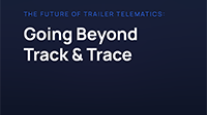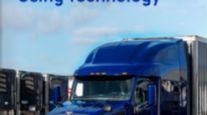Some Truckers Hold Back on RFID, Cardless Fueling
This story appears in the Oct. 3 print edition of Transport Topics. Click here to subscribe today.
With cardless fueling, some trucking officials believe, the future may have to wait.
Radio-frequency-identification systems appear to be ideal, but many said they’re holding out for more industrywide acceptance.
“For us, cardless fueling would eliminate drive-offs.” said Dan Alsaker, president of Broadway Truck Stops in Spokane Valley, Wash. But he’s wary of embracing the technology because the industry might end up with different technology-based systems.
RFID cardless fueling generally works like this: A truck driver pulls alongside a diesel pump, and a radio signal from an RFID tag in the cab beams information to a sensor em-bedded in the pump or fuel lane canopy. The sensor reads the truck’s vehicle information number and sends it to a motor carrier’s computer system for vehicle confirmation and fueling authorization.
“Years ago, there were 17 ways to pay for a gallon of gas. Each company had different systems, and this was their competitive edge,” Alsaker said. “If everyone starts coming out with their own cardless system that has a different twist, we will be right back where we were years ago.”
Gasboy International LLC rolled out its RFID-based Fuel Point system about six years ago. The company, now owned by Gilbarco Inc., Greensboro, N.C., said the newer Fuel Point Plus serves 1,000 sites, and 100,000 vehicles have the company’s RFID tags, said Sanjay Chowbey, Gilbarco’s vice president of commercial business.
Now, two electronic payment companies, Comdata Inc. and Transportation Clearing House LLC, are preparing to debut their cardless fueling programs. Each has lined up a truck stop operator as a customer.
Comdata, Brentwood, Tenn., said its system uses RFID technology, and TCH, a division of Flying J Inc., Ogden, Utah, said its Z-Con cardless program is based on RFID but also employs ultrasonic detection and infrared technology.
Comdata said its system will be used by Love’s Travel Stops, which said it will begin installing RFID technology at its 270 truck stops in the fourth quarter. Both companies are using Fuel Island Manager software from QuikQ LLC, Franklin, Tenn., which develops software that speeds diesel fuel purchases.
“RFID has improved greatly from its early days,” said Ernie Betancourt, QuikQ’s president. A few years ago, RFID became secure enough to work for cardless fueling, he said.
Because cardless fueling requires authorization from a trucking company, there’s little chance of fraud, Betancourt said, and it’s inexpensive to place RFID tags on tractors and trailers. “It only costs a few dollars to hook up a truck,” he said.
Kevin Farnsworth, TCH’s vice president of technology, said Z-Con offers users three levels of verification, which should eliminate hacking. “We believe we have a product that cannot be compromised.”
“We need and want a cardless system that has little or no failure points,” said Mitch Steenrod, chief financial officer at truck-stop operator Pilot Travel Centers LLC. Pilot is slated to use Z-Con exclusively.
Comdata and TCH both said their systems can reduce fuel fraud. “Fuel theft is huge in the trucking industry right now,” Farnsworth said. “Theft can be 2% to 5% of a carrier’s fuel purchases.”
TCH has installed Z-Con in 15 fueling sites in Utah and Colorado Farnsworth said. Z-Con will be available at 445 truck fueling stations next month, he added.
However, Comdata and TCH’s dueling technology remains a hurdle.
TravelCenters of America continues to evaluate cardless fueling and the companies offering it, said spokesman Tom Liutkus. He said it would be more efficient for cardless system players to develop a single technological standard so retailers and motor carriers wouldn’t have to deal with several systems.
Seth Riter,director of maintenance at All Truck Transportation Co., Chicago, said he thinks most motor carriers will accept an RFID-based system used by the providers of their fuel cards. All Truck uses fuel cards from Comdata, he said.
“In all likelihood, the market will determine a winner or winners,” Vince Peschio, QuikQ’s chief technology officer, said. “If one evolves, it will be the de facto standard, if two (or more) evolve, industry traditions will be maintained.”
“RFID, like countless other technologies, will become the norm. The smart companies are the ones that embrace it sooner rather than later,” said Ken Weinberg, vice president of Carrier Logistics Inc.
But not everyone is a fan. Barbara Catlin, spokeswoman for Transcore, Hummelstown, Pa., said the biggest drawback right now for cardless fueling is that there’s little market demand for such systems. Transcore, a supplier of electronic toll-collection systems, is an RFID pioneer.




